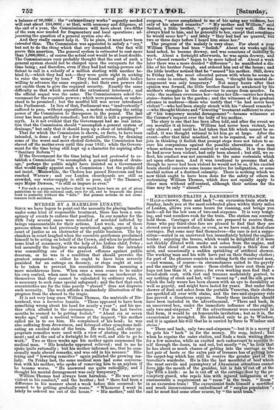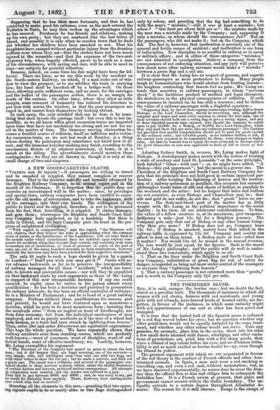EXCURSION-TRAINS A DANGEROUS NUISANCE. "HALF-A-CROWN, there and back "—an excursion-train
starts on Sunday, lands you at the most celebrated place within thirty miles of London, pews you some hours for roaming, and brings you back—all for the low sum of two-and. sixpence. It is very tempt- ing, and vast numbers rush for the train. The station can scarcely hold them. Carriages of all kinds are prepared to receive them. Some who pay third-class fare are pleased to find that they are stowed away in second-class, or even, as we have read, in first-class carriages. But some may find themselves—the case is not a suppo- sition—seated in an uncovered. box immediately, behind the engine- tender • enjoying the breeze, which would be delightful if it were not thiekly'dilated with smoke and ashes from the engine, and with thit cloud of steam which is occasionally a thick' dose of mist, and occasionally a sudden sprinkling of artificial shower. The workingman and his wife have put on their Sunday clothes ; for part of the pleasure consists in setting forth the outward man, —and woman, of course—in circumstances suited to the gayety:. and the amenity of the scene : those clothes have cost them per- haps not less than 51. a piece ; for even working men find that a broad-sloth coat, with vest and trousers moderately genteel, to say nothing of stock and hat, will " mount up "; and the silk gown which the lady wears has been chosen with an eye to durability as well as gayety, and might have lasted for years. But under that shower of dust and ashes from the portable Vesuvius, their clothes are speckled all over with stains, and the two-and-sixpenny ride has proved a • disastrous expense. Surely these incidents should have been included in the advertisement. " There and back, in an uncovered box, under the immediate influence of the engine, only two-and-sixpence." If the advertisement were conceived in that form, it would be an honourable invitation ; but as it is, the excursionist is inveigled. He intended only to go to Windsor, and it is against his will that he is carried by force to Windsor and stains !
" There and back, only two-and-sixpence "—but it is a mercy if he gets his " back " in for the money. He nay, indeed ; but when he regains the outer station, and finds a train waiting there for a few minutes, while an excited mob endeavours to squeeze it self through the doors, in and out, but mostly " in," he feels that he has about as much chance of getting into the carriage as the last pair of boots or the extra pair of trousers has of getting into the carpet-bag which has still 'to receive the greater part of the traveller's wardrobe. He is like the last mouthful of beef which the most servile and peremptory of Abyssinian attentions cannot force to the month of the grandee, but is fain td cut off at the lips -frith a knife : so he is cut off nt the carriage-door by the pc- remptory. guard, who repels him with injured indignation at so unreasonable a requirement as " room " in the train. " Room " in an excursion-tram ! The excursionist finds himself a mortified and much inconvenienced embodiment of " surplus population "; and he must find some other course, by " the next train.'
Supposing that he has been more fortunate, and that he has contrived to make good his entrance, even as the mob entered the Tuileries in Paris, he may then reckon up the advantages which he has secured. Perchance he has friends and relations, making up his own party ; but they are scattered like the lost tribes of Israel, and possibly it is only when he reaches town that he finds out whether his children have been smashed or not. That his daughters have escaped without particular injury from the drunken ruffians near whom they sat—that the clothes have not been much injured in the scramble—and that the expenses of the two-and- sixpenny trip, when happily effected, prove to be such as a man of his circumstances, with saving and care, will be able to meet in time—are subjects for grateful reflection.
Because, indeed, on some lines his fate might have been far dif- ferent. There are lines, as we see this week by the accident on the South-eastern Railway, on which, if a man looks out of win- dow to view the prospect, or to see whither the train is carryong him, his head shall be knocked off by a bridge-wall. On those lines, allowing quite sufficient room, and no more, for the carriages and the bodies of the passengers within, there is no margin for heads of the curious. On other lines, where they allow as little margin, some remnant of humanity has induced the directors to put iron rods across the window, so that the poor passengers are caged in, and cannot hurt themselves by looking abroad. In such cases, the only mischief that can be done is by some- thing that shall invade the carriage itself : but even this is not im- possible as we all know when great excursion-trains are imported upon lines that have not machinery too strong and are not too ex- sot in the matter of time. The immense moving obstruction be- comes a fruitful source of collision, itself an infliction and a victim. An excursion-train, as we saw last week at Burnley, is a thing whose destiny the pointsman may sometimes not know how to di- rect ; and the immense holyday-making may finish, according to the unconscious dictate of an amateur pointsman, at home, or in a smash at the siding. The advertisements should mention these contingencies ; for they are all thrown in, though it is only at the small charge of two-and-sixpence.



























 Previous page
Previous page